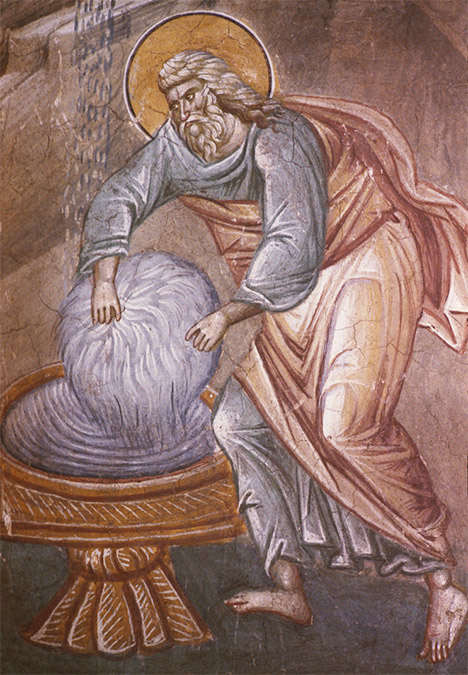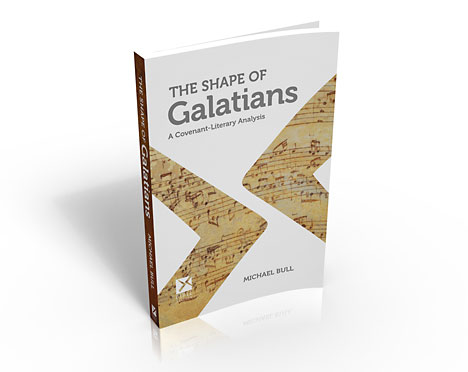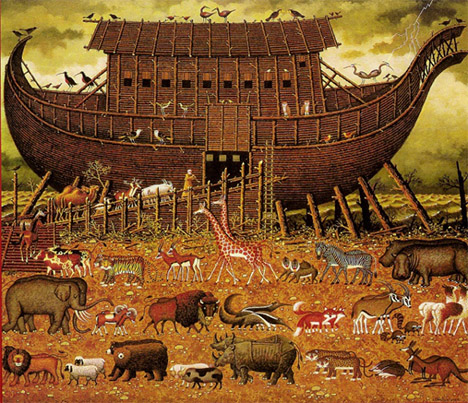Jul
8
2014

In the Bible, everything is confirmed by the testimony of two or three witnesses. (James Jordan notes that this is the basis for Hebrew parallelism and also verbal pleonasm. See Symbolism – A Manifesto.) An example of a “dual” witness from God would include the two dreams given to Joseph, and the two dreams given to Pharaoh. We see each Covenant confirmed by two witnesses as well. The Mosaic Covenant was a double witness at three levels: the two tablets of the Law, the second set of tablets, then a second giving of the Law in Deuteronomy.
A sign was given to Gideon to prove that God would save Israel by Gideon’s hand. He requested a second sign, and rather than chiding him, the Lord acquiesced. The Lord Himself asks us to prove all things. That explains the double sign, but not the ingredients of the signs, the fleece and the threshing floor. Fortunately, the consistency of biblical symbolism and structure not only gives us the answer, it reveals the events as a type of the events which followed, and, typologically, also shines light on the process of the first century apostolic witness.
Continue reading
2 comments | tags: Firstfruits, Gideon, Judges, Literary Structure, Pentecost, Typology | posted in Bible Matrix, Biblical Theology
Jul
2
2014
Raising Cain

“Just as Circumcision made impossible a global corruption,
so paedobaptism makes impossible a global Gospel.”
Part 1 here.
With so many young people leaving the Church, it is no wonder that there is a push to renew an understanding of biblical Covenant. Giving our children a profound sense of their “Covenant identity” is a crucial means of re-establishing the Covenant framework which has been neglected. Unfortunately, those pushing for these things are going about it in entirely the wrong way, because they are re-establishing the wrong Covenant.
Continue reading
12 comments | tags: Abel, Abraham, Babel, Baptism, Cain, Circumcision, Covenant Theology, Genesis, Jonah | posted in Biblical Theology
Jun
28
2014

or Where Kenneth Gentry Is Wrong on the Revelation
Part 1 here.
I’ve been meaning to write this post since I wrote Part 1 (over two years ago). A friend’s recent question concerning Kenneth Gentry’s lectures on the Revelation encouraged me to bite the bullet and bust a gut and get it done. The question is this: Is the Revelation to be interpreted in the light of Josephus’ Jewish War, or in the light of the Bible itself?
Continue reading
6 comments | tags: AD70, Ark of the Covenant, Covenant curse, Covenant Theology, Deuteronomy, James B. Jordan, Kenneth Gentry, Leviticus, Literary Structure, Peter Leithart, Revelation, Revelation 20, Thessalonians | posted in Against Hyperpreterism, Bible Matrix, Biblical Theology, The Last Days
Jun
25
2014
Comments Off | tags: AD70, Herod | posted in Bible Matrix, Biblical Theology, The Last Days
Jun
19
2014

The Shape of Galatians is finally available for Kindle, here.
2 comments | tags: The Shape of Galatians | posted in Biblical Theology
Jun
12
2014

‘Stories are equipment for living.’ – Kenneth Burke
Blog gurus tell you never to blog “off brand,” but this one’s not as off as it might appear.
If you love the Bible and haven’t read Robert Alter’s The Art of Biblical Narrative, you really need to. One of the reasons for the Reading the Bible in 3D seminar in April was to help people understand that the tools they gain from watching quality movies and TV and reading good fiction should not be shelved when reading the Bible. Sadly, it seems most Christians really aren’t interested in understanding the Bible in a new way. They are taught by ministers who have little idea of what they are actually dealing with in the Bible, and the ministers were trained in Bible academies ruled by men without an ounce of the childlike imagination the Bible requires to be understood. Consequently they miss the beauty, the musical rhythm, the intricacies and the constant use of “plant and payoff”, all of which are understood by the best authors. This includes screen writers, who have to say everything the writer of a novel says but in less words. Robert McKee writes:
Continue reading
5 comments | tags: Culture, Film, Robert Alter | posted in Bible Matrix, Biblical Theology
Jun
1
2014

The final vision of Ezekiel is one of the most hotly debated passages in the Bible. Since the structure described has never been built, those who take the passage as fulfilled in history believe it to be figurative. However, the building is described in such careful detail that common sense suggests that something else is going on. The precise measurements remind us of the instructions given concerning the Tabernacle and Solomon’s Temple for the purpose of physical construction. Is Ezekiel’s temple a false prophecy, or does it describe a third, and as yet unbuilt, Temple in Jerusalem?
Continue reading
3 comments | tags: AD70, Daniel, Esther, oikoumene | posted in Bible Matrix, Biblical Theology, The Restoration Era
May
13
2014

“I am the true vine, and My Father is the vinedresser.” John 15:1
One of the problems with exalting Enlightenment thinking over the Scriptures is that it disconnects theology from the real world. One is left to wade through and deal with the sometimes stimulating but mostly irrelevant tomes of philosophers who jettisoned our only source of light. The main reason modern Christians need to be up-to-speed on philosophy is to deal with godless philosophers in terms they can understand. I don’t consider myself to be up-to-speed, but from what I have read, many if not most of the questions they consider to be profound are really just the shadows left once Jesus is locked out. The average man has more pressing matters to contend with, and subsequently has a better grip on real life. For instance, we can spend hours swatting every available philosopher and lawyer on the existence or nature of natural law, and interact with all of them, or we could just ask the man on the land.
This post has been slain and resurrected for inclusion in my 2015 book of essays, Inquietude.
Continue reading
Comments Off | tags: Culture, Romans | posted in Biblical Theology, Creation, Ethics
May
12
2014
Comments Off | posted in Biblical Theology
May
8
2014
The Making of the King James Bible

Continue reading
Comments Off | tags: Church History | posted in Biblical Theology



































